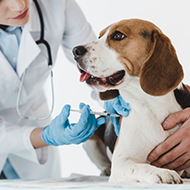Russia registers first COVID-19 vaccine for animals

Clinical trials of the vaccine involved dogs, cats, arctic foxes and mink.
Russia has announced that it has registered the world’s first COVID-19 vaccine for animals, with mass production starting in April 2021.
The vaccine, named Karnivak-Kov, was developed by Rosselkhoznadzor, Russia’s Veterinary Surveillance Service. Use of the vaccine, according to the agency, ‘can prevent the development of virus mutations, which most often occur during inter-species transmission of the pathogen’.
Konstantin Savenkov, deputy head of Rosselkhoznadzor, said: “The clinical trials of Karnivak-Kov, which started in October last year, involved dogs, cats, arctic foxes, minks, foxes and other animals.
“The results of the research allow us to conclude that the vaccine is harmless and its high immunogenic activity, since all tested vaccinated animals in 100 per cent of cases developed antibodies to coronavirus.”
Rosselkhoznadzor found that Karnivak-Kov provides immunity from COVID-19 infection for up to six months.
Savenkov added that mass production could start in April based on Russia's 'largest platform for the production of drugs for animals of the Federal Center for Animal Health.'
“The vaccine is of particular importance because, as noted by the World Organization for Animal Health (OIE), some animal species are susceptible to COVID-19,” he said. “Cases of detection of this disease have been registered in many countries of the world.”



 The veterinary mental health charity Vetlife is inviting the veterinary community to join it for a sponsored cold-water dip.
The veterinary mental health charity Vetlife is inviting the veterinary community to join it for a sponsored cold-water dip.